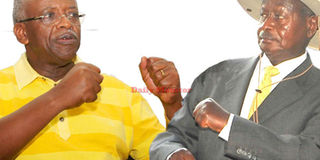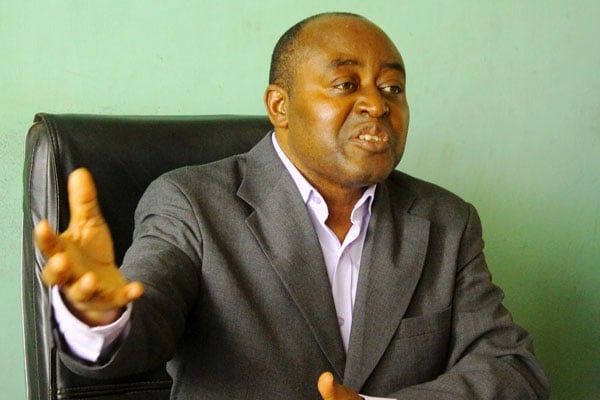BARE KNUCKLES: Museveni cannot stop me - Mbabazi

Photos by Faiswal Kasirye and Wandera Stephen
What you need to know:
Advice. Mbabazi says Museveni should not to seek a fifth elective term to enable Uganda have a peaceful transition of power
LONDON.
“Will President Museveni stop me? I don’t think so, he may try, but I don’t think so,” Mr Mbabazi said.
He said he will task President Museveni to clear the air over the ongoing countrywide arrests of his supporters or else he will find “a way of countering” the detentions which have increased since he declared his intention to run for president in 2016 early this week.
Mr Mbabazi was speaking at the influential London think-tank, Chatham House, in the United Kingdom on Friday. He told the session that he had raised the matter of the arrests of his supporters during his meeting with President Museveni at State House in Entebbe on Monday.
The President, according to Mr Mbabazi, promised to order the Inspector General of Police, Gen Kale Kayihura, to stop the countrywide arrests. He said by Thursday evening, 87 of his supporters had been locked up in police custody in diverse parts of the country.
“I thought this was really a big blunder on the part of the leadership and particularly President Museveni because we fought for 13 years before we took power and one of the reasons why we fought was to restore democracy to give people the freedom to decide whatever they wanted. How could we be the same people to arrest someone purely on the basis of the opinion they hold?”Mr Mbabazi asked.
He was responding to a direct question from Mr Muzong Kodi, an Africa associate at Chatham House, on whether President Museveni will not treat Mr Mbabazi’s challenge the way lead opposition figure Dr Kizza Besigye has been handled since he fell out with the ruling National Resistance Movement in 2001 over what he called deviation from the democratic course and ideals of the 1981-86 Bush War that brought Mr Museveni to power 30 years ago.
Mr Mbabazi revealed that he had on several occasions told President Museveni that such arrests do not “help political work”, citing the 2005 arrest of Dr Besigye in the run-up to 2006 elections. He said his arrest saw his ballots soar from 27 per cent in the 2001 polls to 37 per cent in the 2006 contest.
“The best Besigye ever performed was that time when he was arrested. He got 37 per cent of the votes. It was very close,” Mr Mbabazi told the London think-tank session.
Dr Besigye was arrested in November 2005, four months to the 2006 elections and charged with rape and treason. The charges were later dismissed by the High Court and Constitutional Court respectively. His supporters maintained that the charges were politically motivated to subvert his candidature to the advantage of his rival Mr Museveni.
‘Time for change’
Mr Mbabazi told the Chatham House session on Friday that during his meeting with Mr Museveni at State House on Monday, he reiterated his previous private overtures to Mr Museveni not to seek a fifth elective term if Uganda was to have a peaceful transition of power. “No one has supported Museveni more than I have. It is a fact. Even now I support him. I am only saying what the Bible says in Ecclesiastes 3 that there is time for everything. There is time for change (and) the time for change in Uganda is now. I told the President,” Mr Mbabazi said in London.
On the composition of the Electoral Commission, Mr Mbabazi said the process has to change, adding that he doubts “one or two” of the five commissioners at the electoral body headed by Badru Kiggundu.
Pressed on corruption accusations that have been made against him during his service in government, Mr Mbabazi said with hindsight, he now knows that the 2008 investigation into sale of his land to the National Social Security Fund (NSSF) was a “systematic dirty campaign” to malign him.
Mr Mbabazi said the core of his push for change of government, under his eight-point plan, will focus on reviving democracy.
He blamed Mr Museveni for presiding over last December’s Delegates Conference that amended the party constitution to mandate the NRM chairman to appoint the executive committee of the party. He dismissed that process as illegal.
The NRM secretary general, Ms Kasule Lulumba, did not answer our calls for a comment on the matter. The mobile phone numbers of her deputy, Mr Richard Todwong, and the party’s chief legal adviser, Mr Adolf Mwesige were off. The NRM party spokesperson, Ms Mary Karooro Okurut, was reportedly in Mbarara District according to an aide who answered the phone and asked us to call in the evening.
However, Ms Evelyn Anite, the minister for Youth Affairs, said the decision to amend the party constitution during the December delegates conference at Namboole in Wakiso District was properly and democratically made by majority consent at the members’ free will.
“We had 10,000 leaders (delegates) in Namboole who raised the proposals and that particular matter was also put to vote. Everyone else apart from Jacqueline Mbabazi (Amama Mbabazi’s wife) voted for the proposal to have the party chairman appoint the executive committee. Amama Mbabazi neither voted for nor against it.
He was part and parcel of the whole process, why does he come out now to say the decision of close to 10,000 delegates was illegal? In our party, there is freedom of expression. He should have raised the issue then. Why is he changing position?” said Ms Anite.
Commenting on Uganda’s democratic credentials, with particular emphasis on the removal of presidential term limits from the national Constitution in 2005, Mr Mbabazi told the London conference that the Parliament was unable to make a free choice due to intimidation and bribery.
“Even when by law people are supposed to have a free choice, when you have an atmosphere of intimidation and you have bribery as a primary route or tool used by some elements to influence decisions, you raise the question what choice can people make? Is that choice free or not?” Mr Mbabazi asked.
The bribery claims are a reference to the Shs5m each MP received to go to their constituencies to consult the voters on the Constitution amendments. The money was widely perceived as a government inducement to the MPs to endorse the Constitution amendment to remove the presidential term limits.
However, the government’s media centre deputy director, Col Shaban Bantariza, dismissed Mr Mbabazi’s bribery allegations.
“The President with his Cabinet decided that for purposes of democracy, the MPs go and consult and they were facilitated. What makes him call facilitation bribery? Can he differentiate between bribery and facilitation? When they bought him a Benz as prime minister, was it an offence against him or not?” Col Bantariza countered.
“Mbabazi is trying to get reason to contest and is looking for all possible ways to be believed,” Col Bantariza added.
Chatham House
Chatham House commands good following in government circles in the West and its debates and reports are resourceful for development partners seeking to map a picture of Uganda’s internal social-political situation. The new Nigeria President Muhammad Buhari attended Chatham House in February, two months before a historic win in April.




